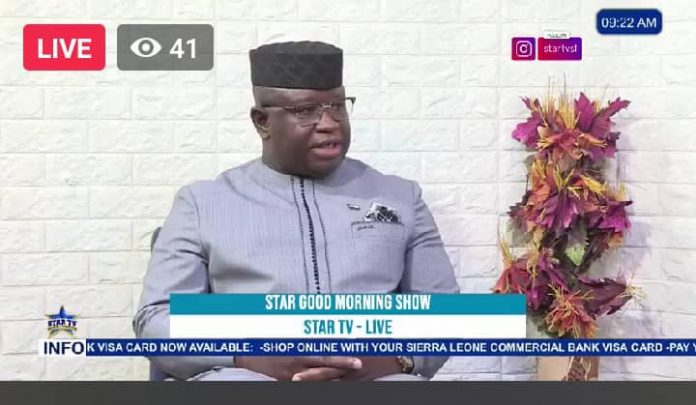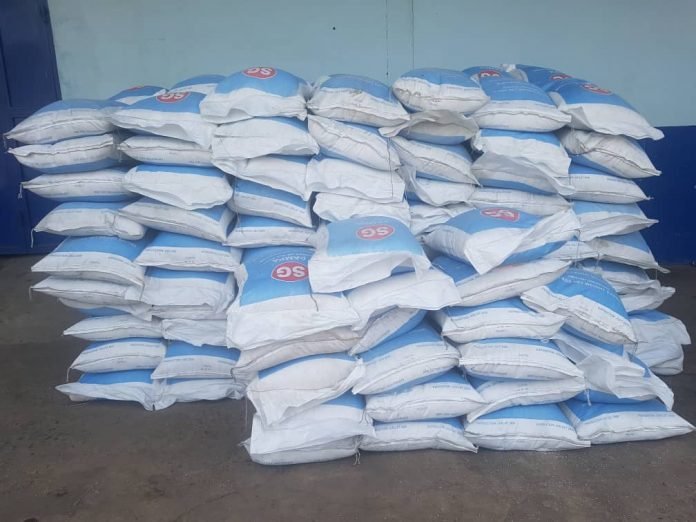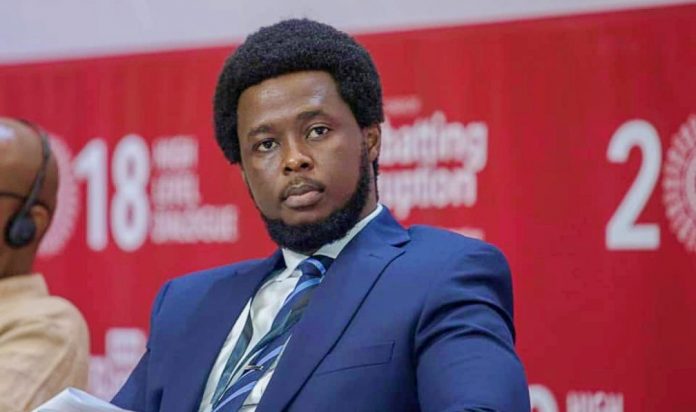By Amin Kef Sesay
On the 7th and 8th April, 2021, His Excellency, the President, Dr. Julius Maada Bio undertook a media tour in Freetown as he was hosted by the Sierra Leone Broadcasting Corporation (SLBC), the Africa Young Voices (AYV), Radio Democracy 98.1, Star Television respectively where he responded to questions bordering on thematic issues relating to the SLPP led Government’s three years in State Governance.
Asked probing questions by the various hosts relating to how he will rate the three years of his Government vis-à-vis overall national development he said there has been achievements and challenges during the period under review.
President Bio said that the state of affairs he inherited in 2018 posed many challenges for his Government, adding that for a developing nation to make meaningful progress human capital development must be prioritized.
“I introduced the Free Quality School Education in every part of the country. Every child must go to school irrespective of their origin and political affiliation. Government is paying fees for more than 2.5 million kids in the pre-primary, primary, junior and senior secondary schools in all regions. And we are making a steady progress by making sure that Sierra Leone regains the lost glory of being called the Athens of West Africa,” President Bio intimated.
He also told the nation that for the first time in the history of the country more proactive steps had been taken to ensure that women and girls, comprising 50% of the country’s population, have a free space in society, adding that his Government is very willing to work with development partners to uphold the dignity of women and girls.
The other area in which he was asked to comment is the fight against corruption. In his response President Bio said there had been massive and genuine efforts placed in fighting corruption.
“Our fight against corruption has been robust and we are making a steady progress. We are not there yet as a nation, but our collective work is helping our international reputation. For the first time in the history of this country we have ranked the highest on MCC scorecards and subsequently we are now eligible for the compact programme. I, therefore, encourage all citizens to join the ACC to make corruption unfashionable,” he noted.
The President highlighted that some people have the wrong perception about corruption maintaining that politicians and public officials are the only ones that are corrupt when in actual fact the teacher or nurse that extort monies from others are not considered corrupt.
He furthered that to say someone is corrupt is an easy allegation to make stressing that it is one thing to say someone is corrupt and quite a different thing to produce the evidence. The President said it is providing overwhelming proof that is very important.
“There is no single instance in which I have influenced the Anti-Corruption Commission Commissioner with regards cases under his investigation,” he informed adding that he has never protected any member of his Government accused of corruption.
President Bio continued that independent institutions out of the country have rated his Government’s fight against corruption very high further making reference to the country’s MCC compact eligibility attributing it to the robust fight against corruption as one of the yardsticks.
Dilating on the utilization of public funds, he stated, that there had been a steady increase in revenue mobilisation, saying that the introduction of the Single Treasury Account had been a major development in managing wasteful spending.
“The outbreak of the coronavirus didn’t only delay our development activities but it also did to every country in the world. But as a nation, we have done a lot in the fight against COVID-19. We are even ahead of the United States of America in dealing with the virus. We are hoping that things will see a turnaround for the whole world,” he asserted.
Responding to his various travelling to different parts of the world and how that should not have been prioritized as against addressing bread and butter issues, President Bio reacted that they were necessary in order to attend important meetings or programmes as other Heads of State did and are still doing. “Sierra Leone should not be a pariah State as we are part of the International Community,” he stated adding that as Head of State it is the State that should finance those movements maintaining that the country’s international image was nothing good to write home about when they took over governance
. He made reference to a particular meeting in which the country should have participated but was denied access because we had arrears to settle furthering that such is now a thing of the past and the country’s international image has improved considerably.
Responding to a question of concerns being raised about sacking people from their jobs and replacing them with his , President Bio stated that it is not peculiar to Sierra Leone as such do obtain even in the United States of America and elsewhere. He said anybody would like to work with trusted people who have the capability to deliver.
In all his responses in the aforementioned areas and others, President Bio made it categorically clear that Rome was not built in a day, that there are challenges which cannot be quickly fixed reiterating that it is not possible for any country to develop overnight as it takes time making reference to Singapore.
A seasoned journalist, Thomas Dixon, posted this on his Facebook page: “Say what you may; only a true democrat will subject himself to media scrutiny. Let’s give credit where it is due. Thank You President Bio for allowing the media to question you on your three years in power.”
There is a particular school of thought within the media landscape that is of the opinion that in as much as the President was engaged by the electronic media, it is but fitting that the Print Media must be given an opportunity to ask him critical and pertinent questions of his stewardship in office after three years.












